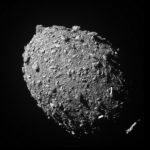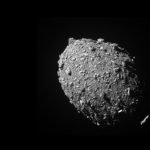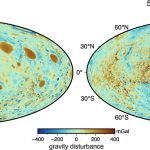Scientists discover Milky Way galaxy’s graveyard of dead stars
In the first map of the 'galactic underworld', a new study has revealed a graveyard that stretches three times the height of the Milky...
Scientists find first traces of the universe’s earliest stars
Astronomers may have discovered the ancient chemical remains of the first stars to light up the Universe.
Using an innovative analysis of a distant quasar...
Scientists discover moon asteroid impacts mirrored on Earth
Scientists have found asteroid impacts on the Moon millions of years ago coincided precisely with some of the largest meteorite impacts on Earth, such...
Synthetic lava in the lab could help explore exoplanets
The exploration era for the new James Webb Space Telescope (JWST) is getting hot – volcanically hot.
A multidisciplinary group of Cornell researchers has modeled...
How NASA deflected an asteroid successfully for the first time
“And we have impact.”
With that phrase, uttered amid the cheers of NASA scientists and engineers Monday evening, the agency’s so-called Double Asteroid Redirection Test,...
Astronomers map distances to 56000 galaxies, largest-ever catalog
How old is our universe, and what is its size?
A team of researchers led by the University of Hawaiʻi at Mānoa astronomers Brent Tully...
Asteroid that formed Vredefort crater much bigger than previously thought
About two billion years ago, an impactor hurtled toward Earth, crashing into the planet in an area near present-day Johannesburg, South Africa.
The impactor—most likely...
Astronomers explain Mars’ watery reflections
There is water in many places on Mars, including most of both polar ice caps – all in the frozen form.
But recently, bright reflections...
NASA’s DART mission hits asteroid in first-ever planetary defense test
After 10 months flying in space, NASA’s Double Asteroid Redirection Test (DART) – the world’s first planetary defense technology demonstration – successfully impacted its...
The moon’s poles have wandered over billions of years
Until 1959, humans had only seen one side of the Moon.
The Moon is tidally locked with Earth, and so we can only see one...










